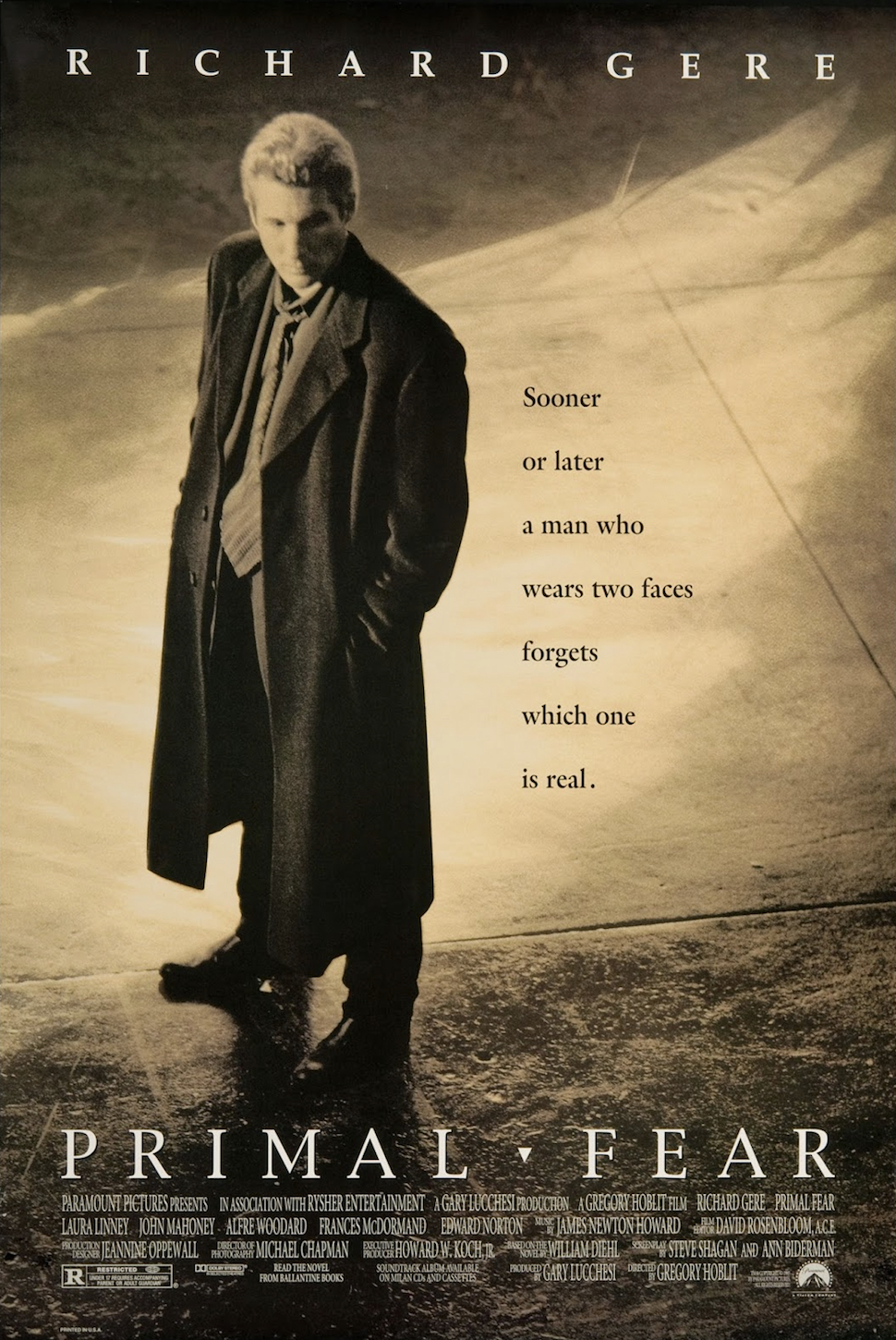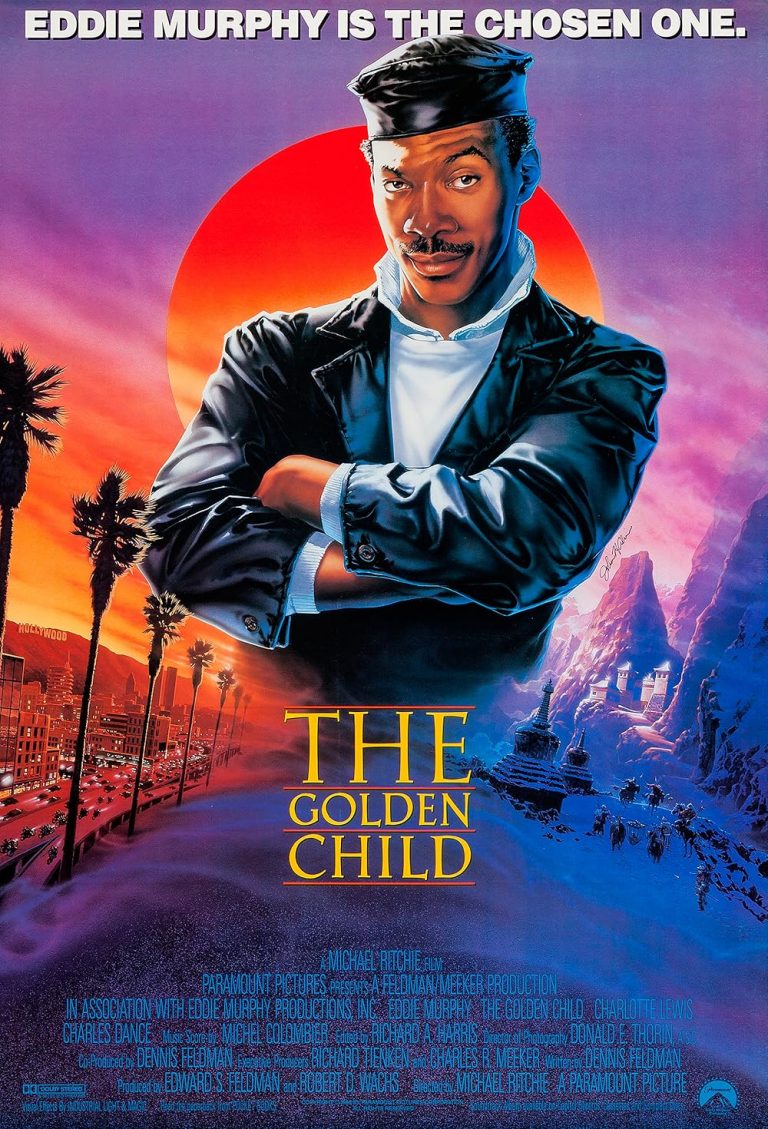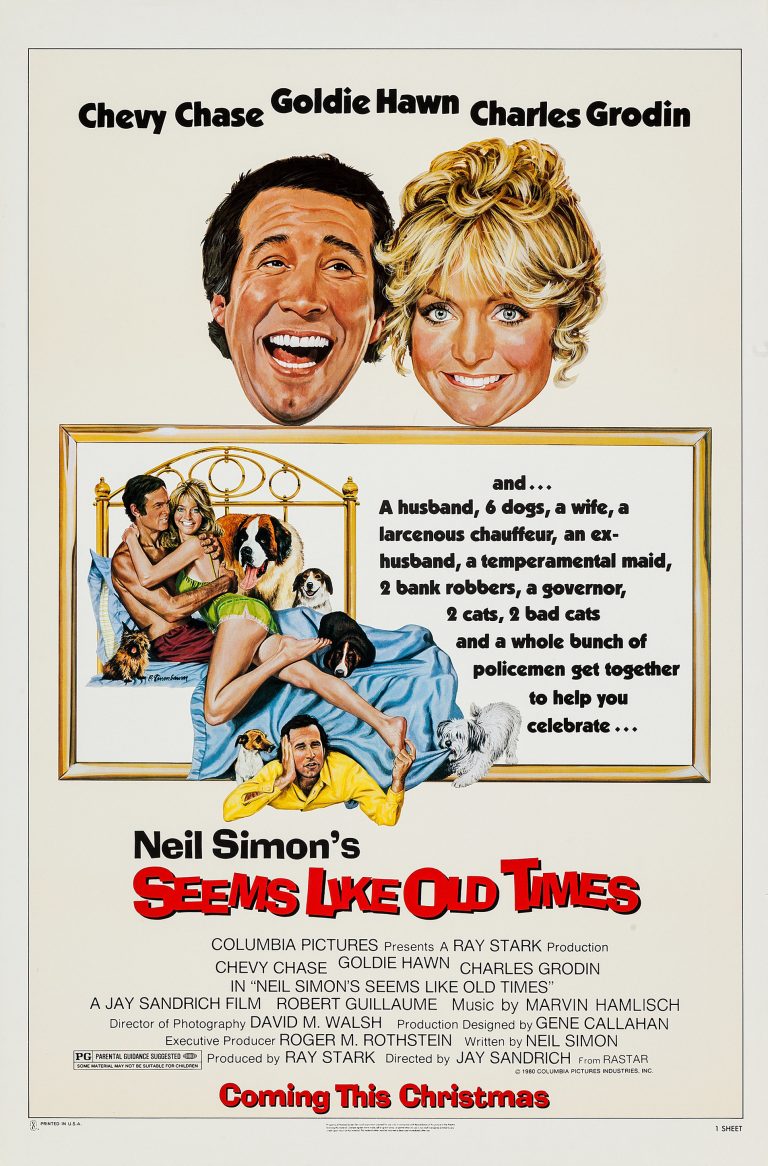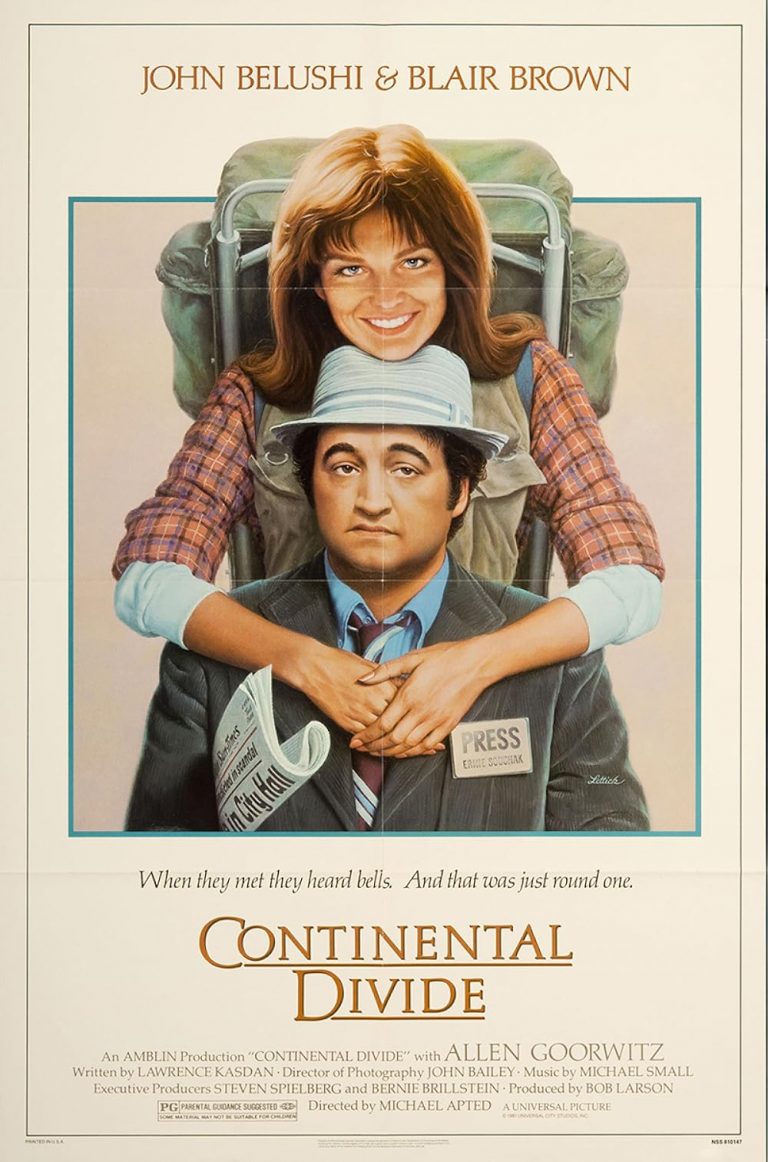Starring: Richard Gere, Edward Norton, Laura Linney, John Mahoney, Frances McDormand, Andre Braugher, Steven Bauer, Maura Tierney, and Drew Carey’s dad from The Drew Carey Show
Grade: A+
“Let’s say you have a client that you know is guilty.”
“No, don’t even start with that. Our justice system doesn’t care about that and neither do I.”
What a wonderful way to start off a courtroom film, one of the best there is I might add.
Summary
After being interviewed for a cover story of some magazine, locally famous Chicago defense attorney Martin Vail (Gere) heads to a charity event to schmooze. After the St. Michaels Boys Choir performs, Martin goes over to speak to state attorney John Shaughnessy (Mahoney). As he does, his ex and assistant state attorney Janet Venable (Linney) excuses herself from the table to avoid him. Martin goes over to try and woo her back by the bar, but she’s not having it. At the same time, Archbishop Rushman (Stanley Anderson) begins his speech after Shaughnessy brings him up.
The next morning, Martin manages to get a $1.5 million settlement for his client Joey Pinero (Bauer) since he was beaten down by some cops, but only after Shaughnessy throws out the offer on the request of Pinero leaving the state. Even though the last part isn’t legally enforceable, Shaughnessy wants it to happen as a gentlemen’s agreement. As Archbishop Rushman is brutally murdered in his house, Martin goes to Pinero with the offer. He agrees to the money but balks at the “leaving the state” part. He then tells Martin that a couple of months ago, a cop said he would “owe” Pinero if he decided to testify against Alderman Martinez and say that he was on his payroll and did him favors, but he refused because Martinez is the only one holding out on not wanting to turn South River into an area for high-rent condos. Martin is pissed because this clearly ties into Shaughnessy’s offer, but they can’t do anything now. Even though they may attempt to kill Pinero again, he reiterates to Martin that he still refuses to leave the state. As the media storms Rushman’s property and the body is being looked at, young altar boy Aaron Stampler (Norton) is seen fleeing the crime scene with blood all over his clothes. Martin sits with his magazine interviewer at a bar. After seeing Aaron on the news, Martin immediately leaves and calls his assistant Naomi (Tierney) to get him the job to represent Aaron first.
Soon after, he meets Aaron in his cell and introduces himself. Though Aaron doesn’t have much money, Martin offers to take his case pro-bono (for free). Martin goes right to work by questioning the boy scout-looking Aaron about how he’s from Creekside, Kentucky, how he met Rushman after Rushman picked him up when he saw him begging on the street in Chicago, and how he was able to live in Rushman’s “Savior House” as an altar boy who sings in the choir. You’re supposed to leave when you’re 18, but Rushman let him stay way past his 19th birthday. He’s very appreciative of what Rushman has done for him and insists he’s innocent in all of this, telling Martin how there was a third person in the room who actually killed Rushman. When Aaron saw this other guy, he “lost time”, meaning he blacked out and couldn’t remember anything. When he woke up, he was covered in blood and ran because he was scared. Even with this exorbitant amount of evidence against him, Martin takes the case and is fully determined, demanding that from now on Aaron doesn’t talk to anyone besides him. Sometime after, we see Martin back at work. Despite the media dubbing Aaron “The Butcher Boy of St. Mike’s”, Martin is proud to tell his office that he’s taken Aaron’s case, working with Naomi and Martin’s investigator Tommy (Braugher) over the details. One positive is that the prosecution doesn’t have a motive, so they have to work in proving someone else could have committed the crime and establish reasonable doubt. Another detail is that “B32.156” was carved into Rushman’s chest. Along with asking for previous cases related to the crime, he also makes it known that he wants to work with a psychiatrist.
Complicating things is the fact that the very powerful Shaughnessy was a close friend of Rushman, and his influence will be felt all over this case.
Meanwhile, Janet is offered the job to prosecute. Off the bat, Shaughnessy tells Janet that he wants the death penalty, but she’s not about it. Regardless, she’s told that this is a pretty easy case, which concerns her because they just said that they wanted the “best”. Clearly, if the case is easy as they say it is, they don’t need her because a public defender would plead no contest and Aaron would be at the mercy of the court. This is where she learns that her ex in Martin (of all people) took on the case, making this a bit of a problem. Following this, Martin runs into Janet at the crime scene, and they take a look at pictures of it together. At the same time, they discuss why Janet didn’t quit the state’s office after Martin did, and her denying that she took the case just because he was involved. Once she leaves after giving him shit, and we see Martin meet up with Aaron in his cell to reiterate that he doesn’t want him to say anything, we go to the trial. Judge Shoat (Alfre Woodard) resides over the case, and she’s not about any bullshit. After denying Martin’s motion for a psychiatric evaluation first, she asks if Aaron understands the charges against him. At the same time that he responds, Martin tells her he directed his client to not speak on the grounds of what he says may be used to incriminate him. He will plead the fifth on any and all questions posed against him until the psychiatric evaluation, citing a previous case to do so.
Elsewhere, Tommy goes to investigate a small hotel room Aaron stayed in and is attacked by some young man, though he manages to rip out his earring as the guy escapes. Following this, Martin goes to Aaron’s cell and shows him the earring, with Aaron noting that it belongs to another altar boy named Alex, though he doesn’t know where to find him. Martin questions Aaron further about his girlfriend that he didn’t mention before in Linda, but he doesn’t know where she’s at either. Martin wonders if Alex could’ve been the “third man” that killed Rushman, but Aaron again acts clueless to the situation. Later, neuropsychologist Molly (McDormand) meets with Martin and agrees to talk with Aaron and evaluate him because Martin believes he’s telling the truth. However, she won’t go in there to “validate his story”. She meets with Aaron, and they discuss his blackouts while she records the conversation, with Aaron telling her that they started when he was 12. We also learn that his mother was long passed by then and his father was a bad man. At some bar, Martin pulls Janet away from a conversation with her superiors to ask when he’s getting the discovery file. She thinks he’s there to make a deal, but he denies this and gives her shit for not checking any of the boxes besides evidence with her case. He also tells Janet that if she loses the case, she’ll take the fall and not Shaughnessy. Martin tries to convince her to not go through with the trial, but she doesn’t want to hear a word he has to say, finishing with the line, “See you in court”.
In reality, it’s like saying, “This means war”.
What Martin doesn’t realize is that this isn’t just about his ex. It’s a much bigger conspiracy that may involve the highest of city officials and the Catholic Church. Also, at the center of it all is the more-to-him-than-you-think Aaron Stampler.
My Thoughts:
Right from the beginning of Primal Fear, Martin Vail sets the tone.
What’s interesting about Martin is that he put himself in this situation, completely unprovoked. If you didn’t know, Martin has a bit of an ego, played tremendously by Richard Gere in arguably his best role to date. Numerous times, we see him hanging with an interviewer for a magazine where he not only talks himself up but also explains the inner mind of a “big-shot attorney”, something he actually calls himself when he meets Aaron. Martin Vail loves being on television, the cover of magazines, and anywhere else he can plaster his face. He loves being at the center of the public eye and though it’s not explicitly said, it’s assumed Martin wanted this case for that exact reason. Killing the Archbishop of the Catholic Church is big time press, and Martin even takes the case for free just to be a part of it. Is he doing this for the right reasons? It’s hard to say. Much like how Mickey Haller was in The Lincoln Lawyer, it seems like Martin is in too deep to be doing this for the right reasons, or is it because of his exterior that he displays to everyone else that we think that?
In a drunk conversation, Martin reveals some truths about him that we didn’t realize needed to be confirmed. Though earlier on, he admits to his employees that he thinks Aaron is telling the truth, it almost seems to be him putting on a front to instill confidence in his defense. However, in that drunken conversation with the interviewer, he admits he genuinely believes “in the basic goodness of people”. Interestingly enough, he chooses to “believe that not all crimes are committed by bad people” and sometimes “very good people do some very bad things”, even using himself as an example on the last statement. This strengthens his belief in Aaron in the eyes of the audience very well because up until this point, you’re not sure why he gets so invested in this case that he didn’t have to be a part of. Small asides like this are all we really need to understand Martin’s true self rather than the character he puts on for everyone else and in the court room. Honestly, I liked learning about this closed-off Martin the best. Even though the most entertaining part of Primal Fear is watching the “big shot” in Martin parade across the screen, these small conversations where we see him behind-the-scenes planning things and getting to know how thought-out everything really is, makes this character feel whole. Another great example of this is the scene in which Martin flips out on Naomi and Tommy once Janet’s team uncovers the writing on Rushman’s chest revolving around The Scarlet Letter, with Martin acknowledging they’re getting their asses kicked in the case (“What the fuck happened in there?”).
Even when we see his true self and intentions throughout, the media coverage was still a big part of his decision to join this whole thing. At one point, he asks Janet, “Who’s the real headline chaser?”.
It’s you Martin, and it always will be.
Because he’s that bad of a headline chaser, he’s effectively screwed his office and put them in a seemingly unwinnable case with him. He didn’t need this. Martin is highly successful already, getting 40% commission as it is. The Joey Pinero settlement nets him $600,000 alone! At this point, it’s almost as if he wanted the challenge, along with the headline that puts his name out there. We even see the ego-driven Martin watching himself appear on the news as he studies for the case. Martin’s arrogance tiptoes the lines of sleaziness, but it works for him, mostly because of Richard Gere’s cool, funny, and charming presence on screen. Gere has this subtle flare about him with every small line he says. He can be dead serious for a second and then switch in a heartbeat to his flirty personality, having fun with whoever he talks to. There’s an excellent scene that doesn’t necessarily go anywhere plot-wise, but it shows off the personalities of Martin and Janet perfectly. This happens in the bar, shortly after Martin is able to stall the trial by demanding a psychiatric evaluation first. Janet gives Martin props for having Aaron plead the fifth for everything and despite him being dead serious before this, he switches to that smile saying, “It was good, wasn’t it? I liked it”.
It’s a very simple line, but Gere says it in this equally charming and arrogant way that you can’t help but think, “Damn, this guy is good”.
Janet is a good prosecutor, but the added element of them being former lovers and on opposing sides of the trial adds another level of exciting drama to watch unfold. She’s not a bad person at heart, but she’s weirdly aggressive about most things, even in the way she talks. It’s very sharp and direct, and Laura Linney gives a very underrated performance in bringing this role to life. When Martin tells her to drop everything and she refuses on the basis that they “have a fucking great case”, she means it. What makes her a somewhat formidable opponent for Martin Vail is that due to her six month “one night stand” with him (as she calls it), she’s savvy enough to see through Martin’s tricks. Her major fault is that though she knows at times what Martin is trying to do, she still goes through with certain things because her ego makes her think she can beat him despite his trickery. Janet takes this case because she has a bit of this “something to prove” attitude, but Martin’s outward, “cool guy” demeanor in court gets under her skin from the beginning. She tries to be straightforward, but Martin goes with the slick lawyer routine and pisses her off on numerous occasions, even though he’s not technically doing anything wrong.
Think of a scenario where you and your ex are both lawyers and now you have to go against each other for everyone to watch. In terms of entertainment value, this is a movie in itself.
I loved their early bickering. Judge Shoat having to play the role of babysitter gets pretty funny too, especially when Martin hits Janet with funny line after funny line. She argues he’s even going to object to bringing the murder weapon in, with the argument that she’s just trying to shock the jurors, and he responds with a smirk, “Well now that she brings it up…”.
It’s gold in context. Trust me.
Janet has this constant battle in her head that Linney is able to exude so well. As I was saying before, Janet is her own worst enemy. Not only does she constantly think Martin is out to screw her somehow during this case and refuses to fall for bait, but she falls for it anyway at times because sometimes the positives outweigh the negatives for her, and she still thinks she can beat him at his own game. Her confidence in her own abilities outweighs everything, especially in the case of the tape. It would help Martin’s case immensely because it would gain sympathy from the jury. On the other hand, the tape also gives Aaron motive which would help her case. Since Martin finds it first but he can’t introduce it himself because it’s too late to plead insanity, he has Tommy send it directly to her. She calls him out on this and even though he pleads ignorance, everything she assumes is exactly what Martin had planned. She goes through with it anyway though because she’s still uber confident in herself and her case, with motive being the only thing they were lacking up until this point. This is the constant thinking Janet has to do to outwit her highly experienced and savvy opponent who is trying to think twenty steps ahead. The problem is that Martin doesn’t show his emotion in public, and Janet does. No wonder she smokes so much! Janet is also interesting because though she may be an antagonist for Martin, she’s not all bad. She’s just trying to do her job as assistant state attorney and show Shaughnessy he picked the right person. Sure, it would feel good to beat Martin, but she doesn’t hate him.
Irritated by him yes, but she doesn’t hate him.
Can you believe this was Edward Norton’s debut role in a major motion picture? What a talent! Even in a Richard Gere-centric film, Norton shows why he’s considered among the best pure actors of his generation. Aaron Stampler is a tough role to do believably because a character with a split personality is hard to pull off. You have to make both parts be completely different and make us believe this person is indeed suffering from this disorder. The main personality we deal with for the most part is Aaron. He’s an innocent young man with a stutter and a horrible upbringing that found him leaving Kentucky to beg on the streets of Chicago. Eventually, this would lead him to Rushman and the Catholic Church. Though he was taken in when he needed it most and is very thankful for what Rushman did, we find out the traumatic things that happened there like the contents of the infamous tape. Because of the happenings in his life, he developed a split personality in his pre-teen years. He explains that he loses “time” and blacks out. When this happens, the wicked “Roy” comes out.
Roy is aggressive and prone to violence. His reactions are basically a defense mechanism for the much shier Aaron. When he flips, he frightens everyone. Roy is unpredictable and doesn’t give a shit. With enough pressure given to Aaron, Roy will come out and with a vengeance. Besides the scene with Molly, the best part had to have been when Martin meets Roy for the first time. Martin starts screaming at Aaron, getting in his face while calling him names and such, pushing him around to once again show that he’s a not a lawyer you mess with. Then, Roy comes out and scares the absolute shit out of him, calling Martin’s bluff. Look, I love the Martin Vail character but seeing him get called out on his know-it-all mentality was pretty cool to see. As untouchable as Martin seems everywhere else, his own client sees through his bullshit and was seconds away from beating his ass. We know this alone would’ve helped make this an open-and-shut case of insanity, but Martin can’t change their plea in the middle of a trial. This adds another fun conundrum for this trial that this famous lawyer has to find his way out of. Honestly, I loved every second of it.
Along with the very important case of Aaron and the reveal of Rushman’s “purging the devil” tape, the added detail of corruption within the Catholic Church, and Rushman’s charities and foundation investments being linked directly to the South River deal and Shaughnessy, was really cool because it added another thing to throw off Martin’s case, or even help it when it was dead in the water. It motivates him in a different way as we see he cares much more than we initially thought. Seeing what’s going on behind-the-scenes, he tries to spin this to involve Shaughnessy and the corrupt investors who only have their eyes on this trial because of their money being lost. His status as a hotshot lawyer can’t leave them untouched, especially if Joey Pinero’s life has already been threatened, and seeing city-wide corruption being uncovered is always good. Because of this, boy did it feel good when Martin goes in fearless mode when faced with Shaughnessy’s threats. It’s always about the money, isn’t it? As soon as millions get involved and they are lost, someone has to die. Though Aaron is the problem at hand, seeing Martin try to expose Shaughnessy’s ass on the stand felt damn good, even though Judge Shoat gave him a sizable fine because of it, with him hilariously saying back to her, “So what you’re telling me is that I can’t get a fair trial in your court room?”.
Well, “that’s for Joey Pinero you little shithead”.
Though this side story won’t be the thing you remember when the movie is over, it adds a lot to the already gripping plot placed in front of us.
Primal Fear is one of my favorite courtroom movies ever. With fantastic performances by everyone involved (especially our leads), interesting characters that keep the plot moving, a case that becomes more and more absorbing as the narrative goes on, and a picture-perfect ending that caps everything off, you can’t get much better than this.





+ There are no comments
Add yours